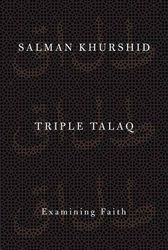Senior advocate Salman Khurshid’s involvement in the triple talaq case was somewhat of a roller-coaster ride for him. He started out as a lawyer for the All India Muslim Personal Law Board in the matter. However, the board later replaced him with his party colleague, Kapil Sibal. He then offered his services as an amicus to the apex court.
Khurshid writes about this in his book Triple Talaq: Examining Faith. The board, he says “...did not feel obliged to tell me that they did not require my services”. He, however, notes that it came as a “blessing” as he was no longer bound by the limitation of having to argue the board’s brief.
Clearing the air on his actual role in the case, the lawyer-politician states that he had made an application for intervention in the case so that he could present his stand before the court. Khurshid writes: “Upon being asked by the Court which side I supported, I responded that I was offering an amicus brief without fully supporting either side.”
He helped the judges, starting with the most basic of preparations to deal with the sensitive matter. He had noticed that the court was curiously proceeding without an appropriate published version of the Quran. “So, I asked my young colleagues to get enough copies of the edition for the judges as well as other arguing counsel. They promptly trawled the alleys of Daryaganj and picked up numerous copies, most of which have now been donated to the Judges’ Library,” writes Khurshid.
He also notes how the copy that he signed for senior advocate Anand Grover disappeared before his side could conclude its arguments. There were other books that went missing as well, prompting Justice Kurian Joseph to quip that God would ensure that the books reappear, just as they had vanished.
The book chronicles, for posterity, the process through which the Supreme Court reached its historic verdict that held the practice of triple talaq in breach of fundamental rights.
Khurshid has brought out the contemporary context of the case, and analysed with scholarly insight the complexities involved in dealing with an issue that is part of Muslim personal law. He also clears the mist around Islam’s provisions for divorce.
He notes that the Muslim Personal Law Board failed to sense the mood of the moment. “Triple talaq was never such an important element of Islam or a Muslim’s iman that, in making the decision to actively defend it, we should have put the entire edifice of faith in peril,” he writes.
He constructs the political context of the case, which involves the BJP government being extremely vocal on banning triple talaq, and the case renewing interest in the Uniform Civil Code. The Modi regime has since introduced a bill to legislatively operationalise the Supreme Court judgment.
Khurshid cautions that any attempt by Parliament to venture into this area will inevitably return to the Supreme Court, where a later generation of judges will have to look at the present judgment for guidance.
Triple Talaq: Examining Faith
By Salman Khurshid
Published by Oxford University Press
Price: Rs 395; pages 260


